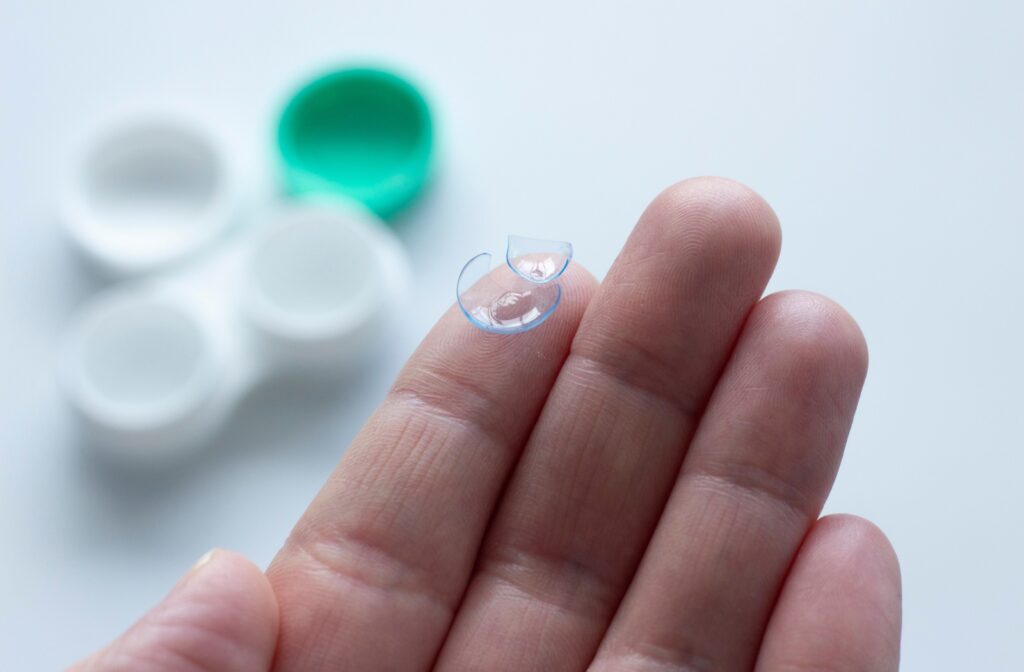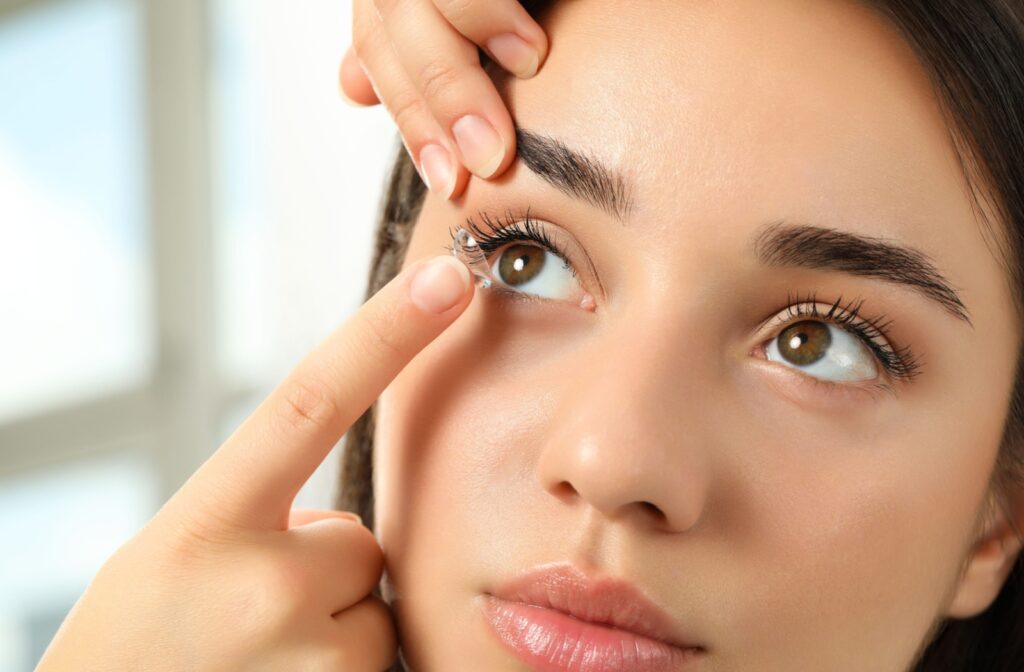Contact lenses are a convenient alternative to glasses, but they require some extra care to ensure safe and comfortable use. Since they sit directly on your eye’s surface, they can cause issues like infections or corneal scratches if not handled properly.
The good news is that preventing complications is simple when you follow your eye doctor’s guidance and the specific instructions for your lenses. Each type of contact lens is different, so it’s important to pay attention to manufacturer recommendations to keep your eyes safe and healthy.
How Can Contacts Damage Your Cornea?
Contact lenses are designed to float on the tear film, the layer of tears that covers the cornea. While this allows your contact to provide clear, convenient vision, it also means there’s a potential for corneal abrasions if they’re not handled properly. Fortunately, you can avoid most of these risks with the right care.
Inadequate Lens Hygiene
Good hygiene is crucial for eye health. When contact lenses aren’t cleaned properly, particles or debris can get trapped under them, causing friction against your cornea and potentially leading to scratches. Regularly cleaning and disinfecting your lenses helps keep them comfortable and safe.
Improper Lens Usage
Sometimes, we can unintentionally cause damage by mishandling our lenses—whether forcefully inserting or removing them or inserting a lens inside out. Placing lenses on a dry eye without sufficient lubrication can also cause discomfort and irritation.
If you have chronic dry eye, your eye doctor will often work with you to address these issues before recommending contact lenses.
Sleeping with Contacts
If you wear lenses not designed for extended wear, sleeping in them can reduce the oxygen supply to your cornea and dry out your eyes. This increases the risk of scratches and can lead to more serious infections.
Always follow your eye doctor’s advice about which lenses are suitable for overnight use.
Poorly Fitted Lenses
Not all lenses fit every eye the same way. If your lenses don’t fit correctly, they may rub against your cornea, causing irritation or abrasions. After your initial exam and fitting, your eye doctor may provide a trial pair of lenses you can test to ensure they will work for your eyes.
Overusing Lenses
Wearing contacts longer than recommended can compromise their effectiveness and deprive your eyes of the moisture and oxygen they need. It also increases the likelihood of scratches, especially in dry environments or when you’re spending long hours focused on a screen.
Following your doctor’s guidance on wear time is essential for keeping your eyes healthy and comfortable.
Wearing Aged or Damaged Lenses
Over time, wear and tear on contact lenses can lead to small rips, uneven edges, or deposits building up. These imperfections can come into contact with your cornea, increasing the risk of scratches.

Signs of a Corneal Scratch
Identifying a corneal scratch is crucial due to the range of discomfort it can cause. Some symptoms include:
- Sudden sharp pain or discomfort in your eye
- Eye redness and swelling
- Excessive tearing or watering
- Sensitivity to light
- Blurred vision
- The sensation of having something in your eye
What to Do About a Corneal Scratch
If you suspect you’ve scratched your cornea, taking the right steps can help protect your eye while waiting for a medical professional.
Remove Contacts Safely & Promptly
Remove your contact lenses as soon as possible. Continuing to wear them can worsen the issue and slow the healing process.
Refrain from Touching or Rubbing Your Eye
As tempting as it might be, avoid touching or rubbing your eye. Rubbing can aggravate the scratch and introduce bacteria, increasing the risk of infection.
Use Lubricating Eye Drops
Artificial tears or lubricating eye drops can help soothe irritation, keep your eye moist, and protect it during healing. Follow the recommended dosage and use preservative-free drops to reduce the risk of further irritation.
Avoid Certain Over-the-Counter Medications
Some over-the-counter eye drops may seem helpful, but those containing steroids can make infections worse or slow healing. Always consult your eye care professional before using any medicated eye drops, even if they’re available without a prescription.
Preventing Corneal Scratches Caused by Contacts
Prevention is the best cure. Following an enhanced care regimen when wearing contacts can effectively minimize the chances of getting a corneal abrasion.
Adhere to Proper Hygiene
Always wash your hands thoroughly before handling your contact lenses. Clean and disinfect your lenses regularly with the recommended solution, and never store them in old solution or tap water.
Change Lenses as Advised
Stick to the recommended replacement schedule for your lenses—whether daily, biweekly, or monthly. This helps prevent lens degradation and reduces the risk of scratches.
Ensure Adequate Lubrication
For those with dry eyes or who work in dry or air-conditioned environments, lubricating eye drops can help prevent lenses from drying out and sticking to the cornea.
Schedule Regular Eye Check-Ups
Regular visits to your optometrist ensure your lenses fit properly and allow you to detect any changes in your eye health that might need attention.
Avoid Sleeping with Contacts
Unless specifically approved for overnight wear, always remove your contacts before bed to avoid unnecessary strain on your eyes.
Discover a Solution That’s Right for You
When used responsibly, contact lenses can be a safe and effective way to enhance vision. While corneal scratches can occur, maintaining proper hygiene, handling your lenses carefully, and following best practices can significantly reduce this risk.
At Los Angeles EyeCare Optometry Group, we offer comprehensive eye exams and personalized lens fitting sessions for the whole family. Contact our professional team today to schedule your appointment.



